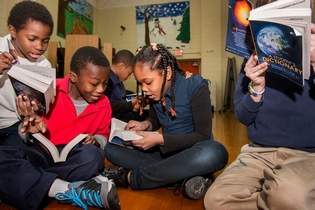Rotarians Delivering on The Dictionary Project to District 150 Third-Graders
Third-graders normally file into gymnasiums for physical education class on a typical Tuesday morning.
Not so for the third graders of Hines Primary School. They were there to receive a book that could help provide some mental calisthenics.
In order to help promote literacy in the area, the Rotary Club of Peoria-North handed out dictionaries to all the third-grade students at Hines. Tuesday morning’s handout was just one part of the organization’s plan to give dictionaries to all the third-graders in District 150.
“It has maps, pictures, information on historical figures, charts and graphs inside; it’s a real asset,” said Robin Barnes, public relations director for the Rotary. “They’re going to get a lot out of these books.”
Barnes and the rest of the Rotary are working alongside The Dictionary Project, a philanthropic organization that aims to give a dictionary to every student in the country. Since its inception in 1992, the project has handed out 18,255,644 dictionaries to students.
The Hines students, sitting on the gym floor, eagerly took the blue dictionaries with a very blue Earth on the cover. They could take these books home and keep them forever, an idea that seemed foreign to some students.
“They would ask me if I could keep it, and I told them it was theirs to keep forever and ever,” said Ashley Taylor, official club photographer and social media manager. “They just smiled back at me and started flipping through it.”
As more students received their dictionaries, the noise in the gym grew, as if each student were trying to read every new word they saw in the pages.
“It’s very refreshing to see kids get so excited about these books,” Barnes said.
York Powers, family and community coordinator for District 150, stood in front of the page-turning students as he recorded their enthusiasm with his camera phone. While things like smartphones and computers have replaced books for many, Powers championed the resourcefulness of dictionaries.
“It’s a resource that will never go out of style. Computers will crash and electronics will be made obsolete, but dictionaries will always be around and will never die,” Powers said. “This is an actual tangible learning tool for the kids to take home.”
While the Rotary had the students look up words like “school” and “learn,” they didn’t need much motivation to sift through the pages. They showed each other words and laughed.
Taylor pointed out the last word on the last page of the dictionary to students: the scientific name for an enzyme that is made up of 1,909 letters.
“They were really curious about it, they were asking me if it was real,” Taylor said. “It shows that they’re excited to learn. That excitement for learning can help them succeed later on in life.”
“It’s extremely important that we stay committed to helping kids learn outside of school,” Powers said. “It’s more than just teachers required to help kids learn. Their home and their community need to help, too. This shows the community coming around and saying that they want to help them learn. It really does take a village to raise a kid.”






